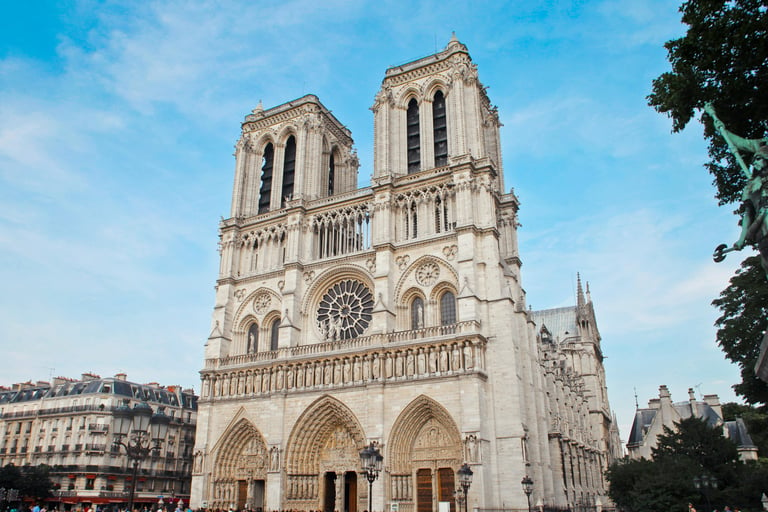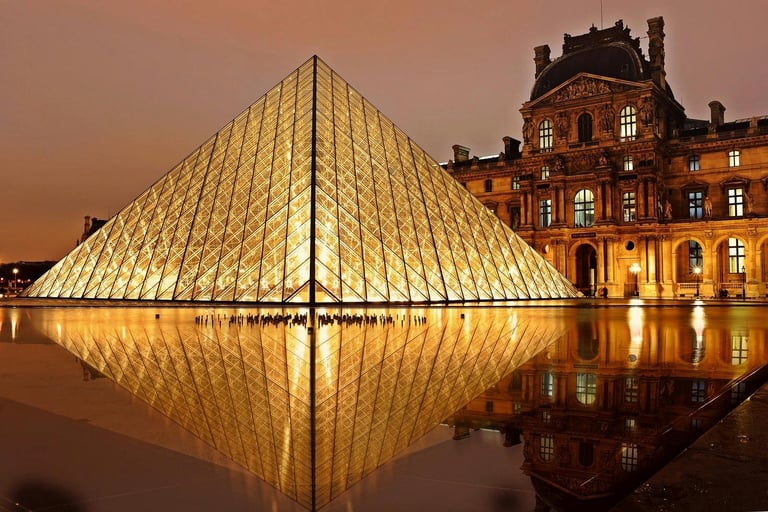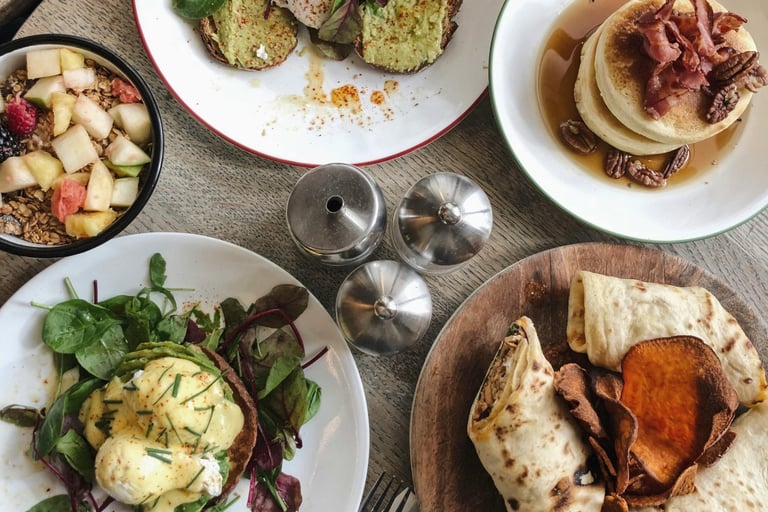Discovering Paris: Landmarks, Specialties, and Reasons to Travel


Iconic Landmarks of Paris
Paris, often referred to as the "City of Light," is renowned for its iconic landmarks that embody the rich history, culture, and artistic heritage of France. Among these, three landmarks stand out for their significance: the Eiffel Tower, the Louvre Museum, and the Notre-Dame Cathedral, each offering a unique glimpse into the city's past and present.
The Eiffel Tower, designed by Gustave Eiffel and completed in 1889, has become a global symbol of romance and engineering prowess. Standing at 324 meters, this wrought-iron tower showcasing intricate iron latticework attracts millions of visitors annually. Not only is it an engineering marvel, but it also offers breathtaking panoramic views of Paris, particularly from its observation decks. Tips for visitors include purchasing tickets in advance to avoid long queues and visiting during sunset for a magical experience as the city lights twinkle below.
Next, the Louvre Museum, the world's largest art museum, is home to an extensive collection of art and historical artifacts. Originally built as a fortress in the late 12th century, the Louvre's glass pyramid entrance is an architectural highlight juxtaposed against the historic palace. Visitors can explore masterpieces including the Mona Lisa and the Venus de Milo, which enhance the cultural tapestry of the museum. To maximize the experience, it is advisable to allocate several hours for the visit and consider guided tours for in-depth knowledge of the exhibits.
Lastly, the Notre-Dame Cathedral is an exemplary representation of French Gothic architecture, dating back to the 12th century. Featuring breathtaking stained glass windows and intricate sculptures, this cathedral has played a central role in the religious and cultural life of Paris. Despite the tragic fire in 2019, restoration efforts are underway, allowing visitors to continue appreciating its historical essence. Engaging with the cathedral's surrounding areas, such as Île de la Cité, offers further insights into its significance.
As seen with these renowned landmarks, Paris offers a rich tapestry of history and architecture that captivates travelers from around the globe. Understanding their historical and cultural significance enhances the overall travel experience, making each visit a profound journey through time.
Unique Parisian Specialties
Paris, renowned for its rich culinary heritage, offers a remarkable assortment of unique specialties that reflect the city's vibrant culture and history. One cannot visit Paris without indulging in its iconic croissants. These flaky, buttery pastries are best enjoyed fresh from a local boulangerie, where the magical aroma wafts through the air, enticing passersby. A well-made croissant perfectly embodies the artistry of French baking, making it an essential part of any Parisian breakfast.
For those seeking more adventurous flavors, escargots de Bourgogne is a quintessential delicacy that commands attention. These snails, prepared with garlic, parsley, and butter, offer a rich, savory experience that is frequently served in traditional French bistros. While it may seem daunting for some, trying escargots serves as a rite of passage for many food enthusiasts visiting the City of Light.
Macarons, on the other hand, are a sweet highlight of Parisian confectionery. These delightful meringue-based cookies come in a myriad of flavors, from classic vanilla to exotic matcha. Pierre Hermé and Ladurée are two renowned patisseries where visitors can savor these colorful treats, often adorned in beautiful packaging, perfect for souvenirs.
Beyond these well-known staples, Paris also boasts regional delicacies worth exploring. For example, the hearty coq au vin, a classic French dish of chicken braised with wine, mushrooms, and lardons, exemplifies the rich gastronomic tradition of the French provinces. Eating local dishes such as this not only satisfies the palate but also provides insight into the cultural significance of food in Paris.
When it comes to experiencing these specialties, exploring bustling neighborhoods like Le Marais or Montmartre can unveil hidden gems—cosy cafes and eateries where local chefs passionately craft their offerings. With each bite, travelers can truly appreciate the essence of Paris, as its unique culinary landscape reflects the city's artistic soul.
Cultural Experiences in the City of Lights
Paris, often regarded as the City of Lights, extends its allure far beyond its iconic landmarks. The cultural experiences available in this vibrant metropolis are as diverse as they are enriching. From the mesmerizing world of art to the captivating rhythms of its music scene, Paris promises visitors a plethora of opportunities to immerse themselves in its distinctive culture.
The art scene in Paris is a significant cornerstone of its cultural identity. The city is home to world-renowned museums such as the Louvre and Musée d'Orsay, which boast masterpieces from legendary artists like Monet, Van Gogh, and Da Vinci. However, it's not just the famous institutions that deserve attention; the streets of Montmartre and the Marais district teem with galleries showcasing emerging artists, providing a glimpse into the contemporary French art landscape. Visitors are encouraged to explore local art fairs and installations, fostering a deeper connection with the artistic community.
Fashion, too, plays an indispensable role in the cultural fabric of Paris. As the capital of haute couture, the city pulsates with style, from luxury boutiques along the Champs-Élysées to vintage shops scattered throughout its arrondissements. Attending a Paris Fashion Week show or simply wandering through the stylish neighborhoods like Le Marais can provide profound insights into the latest trends and timeless classics, making fashion enthusiasts feel right at home.
Furthermore, the music scene in Paris is a vibrant tapestry comprising genres from classical to contemporary. Iconic venues such as the Opéra Garnier and the Olympia host renowned artists, while smaller, intimate settings often feature live performances by budding musicians. Festivals celebrating various music genres, such as the Fête de la Musique, invite locals and tourists alike to join the festivities, soaking up the city’s rhythm.
To truly embrace the Parisian lifestyle, visitors should seek out street performances and local festivals. These events not only provide entertainment but also showcase the rich diversity of cultures that co-exist in this dynamic city. Partaking in these experiences allows travelers to connect with locals, understand their passions, and fully engage with the vibrant life of Paris.
Why You Should Travel to Paris
Paris stands as a beacon of allure for travelers, often referred to as the City of Light, and it holds an irresistible charm that captivates millions each year. One of the primary reasons to visit Paris is its romantic atmosphere, which is palpable in its picturesque streets, stunning architecture, and iconic landmarks such as the Eiffel Tower and the charming Montmartre district. The city's enchanting ambiance fosters a unique experience for couples and solo travelers alike, making it an ideal destination for romance.
A visit to Paris also offers a profound encounter with history. As a city rooted in the rich tapestry of European culture, historical enthusiasts will appreciate its vast array of museums, including the Louvre, home to the Mona Lisa, and the Musée d'Orsay, showcasing masterpieces from the Impressionist period. Walking through the cobbled streets, one can sense the stories that shaped not only France but the world.
Moreover, the vibrant arts scene in Paris draws artists, musicians, and writers from around the globe. The city has been a muse for countless creatives, and today, it continues to inspire through its galleries, street art, and lively theaters. Whether you are attending a gallery opening in Le Marais or savoring a live performance at the Opéra Garnier, the cultural offerings in Paris enrich the travel experience.
For those planning a visit, the best time to travel to Paris is during the spring (March to May) and fall (September to November), when the weather is pleasant and crowds are smaller. Navigating the city is straightforward, thanks to an extensive public transport system, including the Metro and buses. Additionally, potential itineraries can be tailored to suit various interests—beaches and relaxation at the Seine, culinary delights through food tours, or adventure through bike rentals. These factors combined make Paris a top-tier destination worth exploring, and planning your trip can lead to unforgettable experiences.






